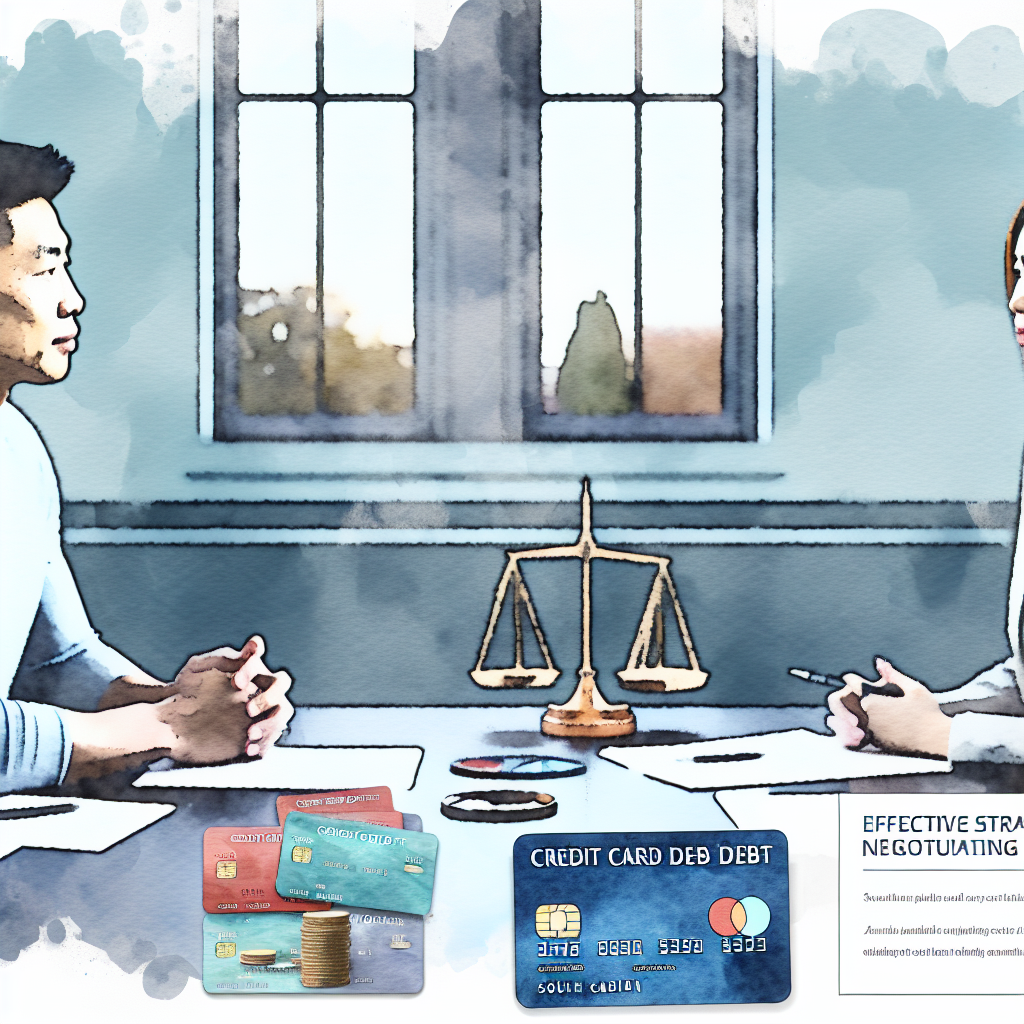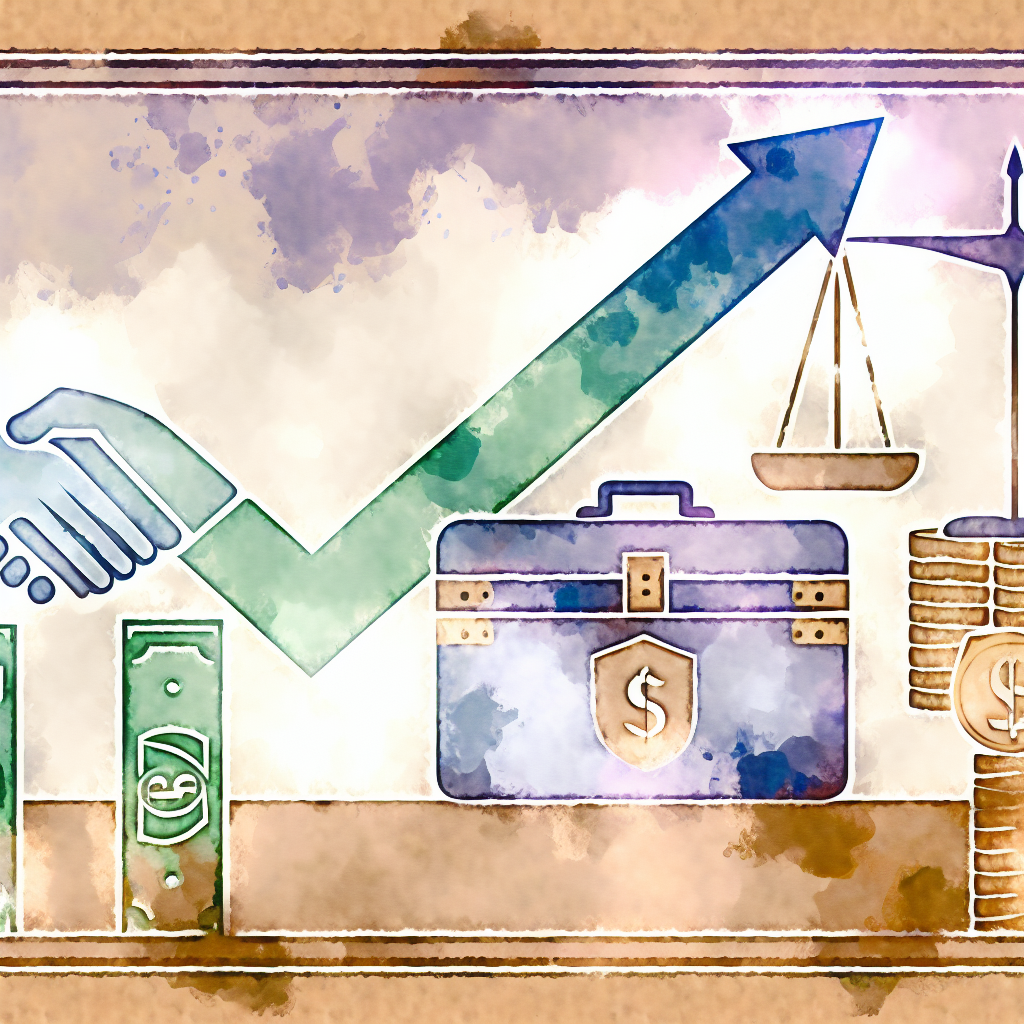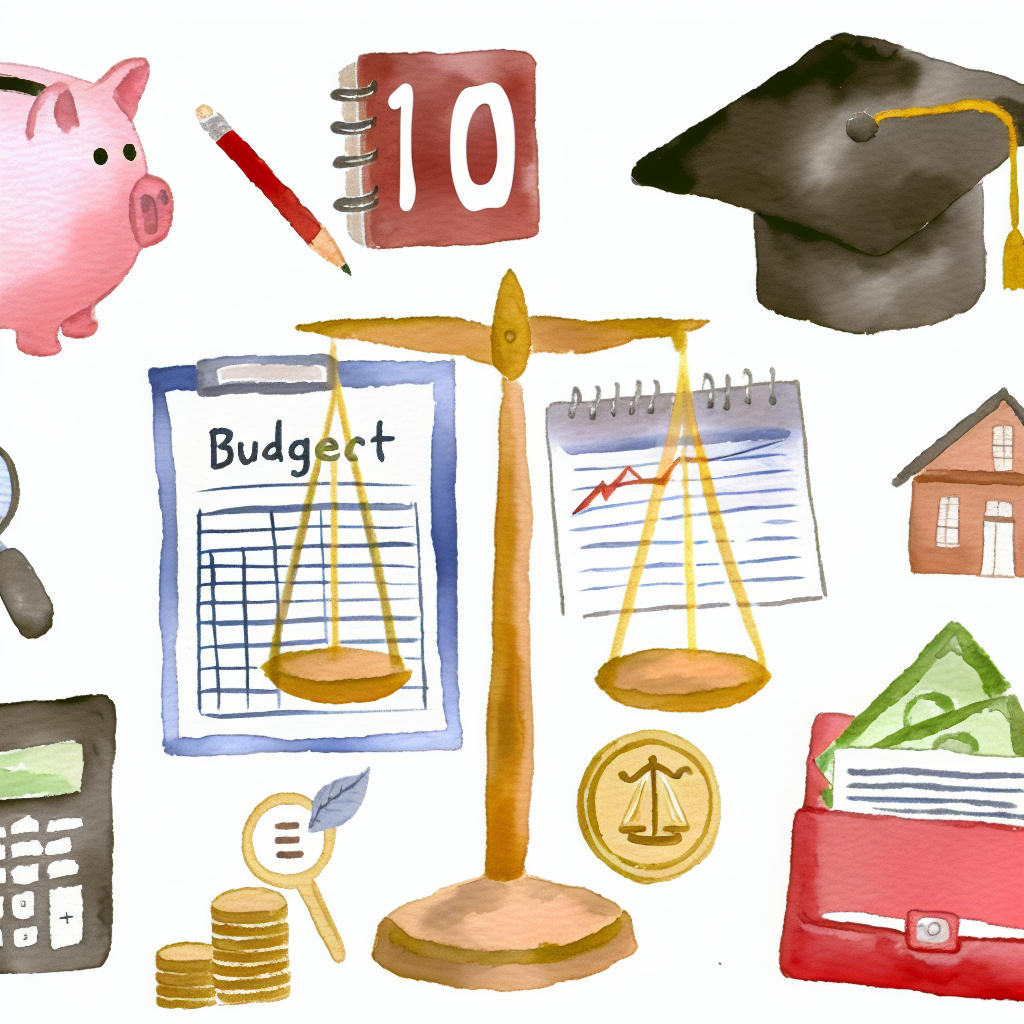Negotiating credit card debt can be a daunting task, but with the right strategies, you can manage your debt effectively and avoid the negative repercussions on your financial health. Understanding what you owe, effectively communicating with debt collectors, and proposing a realistic debt settlement plan are key components that will help you through the process. Along with this, knowing your consumer rights and enlisting professional help when necessary can safeguard you from aggressive collectors and ensure that you settle your debts in a legally sound manner.
Managing credit card debt not only involves settling existing dues but also requires maintaining financial discipline to prevent recurrence. Setting a realistic budget and committing to it will help you manage your financial resources better. On top of this, understanding the impact of debt on your credit score will give you an incentive to remain committed to your financial goals. Gathering all necessary documentation and getting agreements in writing will ensure that you have a legal standing in case of any discrepancies.
Effective communication with debt collectors can defuse tension and create a conducive environment for negotiation. By gathering relevant data and documenting all interactions, you enhance your ability to reach agreeable terms. Exploring consumer rights and protections allows you to confront unethical practices by debt collectors and ensures your dealings are within the legal framework.
By addressing these aspects comprehensively, you’ll be better equipped to navigate the complexities of negotiating credit card debt, thereby achieving financial freedom and stability.
Understanding Your Debt: Know What You Owe
Understanding your debt is the first critical step in the process of negotiating credit card debt. Start by organizing all your financial documents, including credit card statements, loan agreements, and any correspondence from debt collectors. This will give you a clear picture of what you owe and to whom. Creating a detailed list of your debts, sorted by interest rates and amounts owed, will help you prioritize which debts to tackle first.
It’s crucial to review your credit report to ensure that all the information recorded is accurate. Inaccuracies can affect your credit score and could potentially complicate negotiations. You can obtain a free credit report annually from the three major credit reporting agencies: Experian, TransUnion, and Equifax. Double-check all entries to confirm their validity and dispute any errors you find to maintain the accuracy of your debt portfolio.
Additionally, understanding the terms of your debt agreements, such as interest rates, payment due dates, and penalties for late payments, allows you to make informed decisions. This knowledge arms you with the information needed to negotiate better terms. It also helps you understand the total cost of your debt and compare it against your financial resources to develop a feasible repayment plan.
The Impact of Debt on Your Credit Score
Debt has a profound impact on your credit score, an essential factor that influences your ability to secure loans, mortgages, and even employment in some cases. Your credit score is impacted by several factors, including your debt utilization ratio, payment history, and the types of debt you hold. High levels of credit card debt can lower your score significantly, making it challenging to access future credit.
Your debt utilization ratio, which measures the amount of available credit you’re using, is one of the most significant factors affecting your score. Ideally, you should keep your credit utilization ratio below 30%. High utilization rates can signal to lenders that you’re overextended, thereby posing a higher risk. This can lead to higher interest rates on future loans or even rejections for new credit.
Timely payments play a crucial role in maintaining a healthy credit score. Late or missed payments are recorded on your credit report and can remain there for several years, damaging your score and your credibility with lenders. To mitigate this, set up reminders or automate payments to ensure that you stay on top of your repayments.
Lastly, the types of credit you use, such as revolving credit (credit cards) and installment loans (auto loans), can also impact your score. Managing a mix of credit types responsibly can improve your score. But remember, opening new lines of credit just to diversify your credit portfolio is not advisable if you’re already struggling with debt.
Effective Communication with Debt Collectors
Communication is key when dealing with debt collectors. Being transparent and direct can help you establish a more constructive dialogue, which can lead to more favorable terms for debt repayment. Initially, debt collectors may try to intimidate or rush you into making decisions. It’s essential to stay calm and composed, ensuring that the conversation remains respectful and professional.
When you first talk to a debt collector, ask for verification of the debt. Make sure they provide you with the details of the amount owed, the original creditor, and any documentation that supports their claims. This formal request, often referred to as a “debt validation letter,” ensures that you are dealing with legitimate claims and provides you with all necessary information to make an informed decision.
Documenting your interactions with debt collectors is crucial. Keep a record of all conversations, including dates, times, and the names of the representatives you speak to. This documentation can be valuable if disputes arise later on. Maintaining written communication is often recommended as it creates a tangible paper trail that can be referenced if needed.
Additionally, it is often beneficial to communicate your financial situation honestly. By providing a clear picture of your income, expenses, and other debts, you can negotiate more effectively. Most debt collectors are willing to work with you, especially if they see you are making a genuine effort to repay what you owe.
Gathering Necessary Documentation for Negotiation
Preparation is key when negotiating credit card debt, and gathering all necessary documentation is a foundational step. Having well-organized and easily accessible records will make the negotiation process smoother and more efficient. Start by compiling all credit card statements, loan agreements, and any past correspondence with creditors or debt collectors.
A comprehensive financial profile is also essential. This should include your income statements, tax returns, monthly expenses, and a detailed list of all your debts. This information will provide a clear picture of your financial situation, helping you and the debt collectors understand what you can reasonably afford to pay.
Financial documentation isn’t just about proving your financial hardship; it also involves understanding the legalities of your debt. Ensure you have copies of any signed contracts or agreements with creditors. Familiarize yourself with the terms and conditions of these agreements, as they will often dictate the potential for renegotiations or settlements.
If possible, enlist the help of a financial advisor or a debt counselor to review your documents. They can help identify any discrepancies and advise you on the best course of action based on your financial situation. Proper documentation sets the stage for transparent and fruitful negotiations, allowing you to present a strong case for debt reduction or restructuring.
Setting a Realistic Budget: Know What You Can Afford
Creating a realistic budget is a critical step in managing credit card debt effectively. A well-crafted budget helps you understand your financial limits and directs your focus towards eliminating debt. Start by listing all your sources of income and categorizing your monthly expenses into fixed and variable costs.
Fixed costs include essential monthly expenses such as rent, utilities, and groceries. These are typically non-negotiable and must be accounted for first. Variable costs, on the other hand, can include entertainment, dining out, and other non-essential items. Identifying these expenses will give you insight into where you might reduce spending to free up money for debt repayment.
Once you’ve identified all your fixed and variable costs, calculate the total amount you can allocate towards debt repayment each month. Aim to prioritize high-interest debts first, as they cost you more over time. If you find that your expenses are too high, consider areas where you can cut back. For example, cooking at home instead of dining out or finding more affordable utility plans can help reduce costs.
A table can help in tracking your budget effectively:
| Expense Category | Amount Allocated | Actual Amount Spent |
|---|---|---|
| Rent | $1000 | $1000 |
| Utilities | $200 | $180 |
| Groceries | $300 | $280 |
| Entertainment | $150 | $120 |
| Debt Repayment | $500 | $500 |
By maintaining this budget and reviewing it regularly, you can ensure that you’re living within your means and making consistent progress towards debt repayment.
Proposing a Debt Settlement Plan: Tips and Tricks
When you’re ready to propose a debt settlement plan, it’s essential to present a well-thought-out strategy. Begin by determining what you can realistically offer as a lump sum settlement or a series of monthly payments. Typically, debt collectors are willing to accept a percentage of the owed amount if they believe it is the best chance of recovering their money.
Crafting an initial offer that is slightly lower than what you can afford gives you room for negotiation. For example, if you can reasonably pay 50% of the debt amount, propose an initial settlement of 40%. This allows you to negotiate without overstretching your financial limits. Be prepared for counteroffers and ensure that any agreement reached is within your budget constraints.
Here are some tips for effective debt settlement:
- Be Honest and Transparent: Clearly explain your financial situation and why you can’t pay the debt in full.
- Offer a Lump Sum Payment: If possible, a one-time payment can be more attractive to creditors than prolonged payment plans.
- Negotiate for Reduced Interest Rates or Fees: Instead of focusing solely on reducing the principal amount, inquire about lowering interest rates or waiving fees to make repayments more manageable.
Creating a detailed payment plan and presenting it to debt collectors demonstrates your commitment to repaying the debt. The plan should include specific amounts and deadlines, giving both parties a clear roadmap. Make sure to get everything in writing to avoid future disputes.
The Importance of Getting Agreements in Writing
One of the most crucial steps in negotiating credit card debt is getting any agreements in writing. Having a written agreement provides legal protection and ensures that both parties adhere to the negotiated terms. Once verbal terms are agreed upon, request a written contract that outlines the details of the agreement, including the reduced amount, payment plan, deadlines, and any waived fees or interest.
A written agreement serves as a tangible record that can be referenced if discrepancies arise. It reduces the likelihood of misunderstandings and holds both you and the debt collector accountable. Ensure that the document is clear and unambiguous, and don’t hesitate to ask for clarification on any points that are unclear.
Before signing any agreement, review it thoroughly and consult with a legal or financial advisor if needed. This extra step can prevent potential pitfalls, such as hidden clauses or unfavorable conditions that you may not have noticed. Additionally, store all correspondence and agreements in a safe place, as you may need them for future reference or proof of settlement.
Here is a checklist for your written agreement:
- Amount settled
- Payment plan details
- Due dates for payments
- Any waived fees or interest
- Total amount to be paid
- Legal signatures from both parties
Having these elements clearly outlined ensures you are fully informed and legally protected throughout the debt settlement process.
Exploring Consumer Rights and Legal Protections
Navigating the realm of debt negotiation can be fraught with challenges, but knowing your consumer rights and legal protections can empower you to handle these issues more confidently. There are various federal regulations, such as the Fair Debt Collection Practices Act (FDCPA), designed to protect consumers from abusive or unfair debt collection practices.
The FDCPA stipulates that debt collectors must treat you fairly and prohibits practices such as harassment, false statements, and unfair practices. For instance, debt collectors are restricted from calling you at unreasonable hours, using abusive language, or threatening legal action without intention to follow through. Familiarizing yourself with these protections arms you with the knowledge to recognize and report infringements.
Another significant right is the ability to dispute a debt. Under the FDCPA, you have the right to request verification of the debt. If you believe that the debt is incorrect or has been settled, you can dispute it within 30 days of receipt. Debt collectors are then obligated to provide verification before they can continue with collection efforts.
Additional protections come into play if you’re considering bankruptcy. Bankruptcy laws provide a structured way to resolve debts and gain financial relief, though it should be considered as a last resort due to its long-term impact on credit. Each type of bankruptcy (Chapter 7, Chapter 13, etc.) has its own set of protections and consequences, so it’s advisable to consult a legal expert before pursuing this option.
Dealing with Aggressive Debt Collectors: What to Do
Dealing with aggressive debt collectors can be stressful, but there are effective strategies to manage such situations. First and foremost, it’s essential to remain calm and composed during interactions. Losing your temper can escalate the situation, making it more difficult to negotiate favorable terms. Instead, calmly assert your rights and steer the conversation towards a more constructive dialogue.
If a debt collector becomes aggressive or uses abusive language, remind them of your rights under the Fair Debt Collection Practices Act (FDCPA). Inform them that their actions are illegal and that you will report them to the Consumer Financial Protection Bureau (CFPB) if they continue this behavior. Documenting instances of harassment is also important, as it provides evidence should you need to file a complaint.
It’s also within your rights to request that debt collectors communicate with you in writing only. This can reduce the stress of constant phone calls and give you more control over the timing and content of your responses. Sending a “cease and desist” letter can formalize this request, making it clear that you prefer written communication moving forward.
If the aggressiveness persists despite your efforts, consider enlisting the help of a consumer rights attorney. Legal professionals specializing in debt collection can offer advice and represent you in negotiations, ensuring your rights are protected throughout the process.
Maintaining Financial Discipline After Settling Debt
Settling your credit card debt is a significant achievement, but maintaining financial discipline afterward is equally important to avoid falling back into debt. Developing good financial habits is essential for long-term financial stability. Start by building an emergency fund to cover unexpected expenses, which will reduce the likelihood of relying on credit cards in the future.
Continuing to follow a budget is another vital step. Review and adjust your budget regularly to reflect changes in your income or expenses. Aim to live within your means and prioritize savings. By consistently saving a portion of your income, you can create a financial cushion that helps you manage future financial challenges without resorting to debt.
Another crucial aspect is monitoring your credit report. Regularly checking your credit report ensures that your debt settlement is accurately reflected and helps you identify any potential errors early on. Correcting inaccuracies quickly can prevent negative impacts on your credit score and maintain your financial health.
Lastly, educate yourself about personal finance and credit management. There are numerous resources available, including books, online courses, and financial workshops. By continually expanding your knowledge, you empower yourself to make informed financial decisions and sustain healthy financial habits.
Seeking Professional Help: When and Why to Consult a Financial Advisor
Navigating the complexities of negotiating credit card debt can be challenging, and seeking professional help may be a wise choice. Financial advisors or debt counselors specialize in providing tailored advice and strategies to manage your debts effectively. Consulting a professional can help you develop a clear plan based on your unique financial situation.
One of the primary benefits of working with a financial advisor is their expertise in negotiating with creditors and debt collectors. They can leverage their knowledge to secure better terms and conditions for your debt settlement. Moreover, they can help you understand the long-term implications of various debt relief options, such as debt consolidation or bankruptcy, and guide you towards the most suitable choice.
Financial advisors can also assist in creating a comprehensive financial plan that includes budgeting, savings, and investment strategies. This holistic approach ensures that you not only manage your current debt but also build a stable financial future. They can provide ongoing support and adjustments to your financial plan as your circumstances change.
Knowing when to seek professional help is crucial. If you feel overwhelmed by your debt, unable to keep up with payments, or unsure about the best course of action, consulting a financial advisor can provide the clarity and direction you need. They can offer objective, expert advice and strategies to help you regain control of your finances and work towards achieving financial independence.
Conclusion
Negotiating credit card debt may seem overwhelming, but with the right approach and strategies, it’s possible to manage and settle your debts successfully. Understanding your debt, communicating effectively with debt collectors, and maintaining financial discipline are vital components that will guide you through the process. Additionally, knowing your legal rights ensures that you are protected from unethical practices, and seeking professional help can offer personalized advice and support.
By implementing these strategies, you can work towards financial freedom and a healthier financial future. Remember, it’s not just about settling debt but also about fostering long-term financial habits that prevent future debt. Building an emergency fund, adhering to a budget, and staying informed about your credit status will help you maintain financial stability.
Persistence and patience are key. Debt negotiation is rarely a quick fix and often involves continuous effort and adjustments. However, the outcome of financial stability and relief from debt is well worth the effort invested. Keep educating yourself, seek help when needed, and remain committed to your financial goals.
Recap
- Understanding Your Debt: Assess and document all outstanding debts.
- Impact on Credit Score: Recognize how high credit card debt affects your credit rating.
- Effective Communication: Interact respectfully and transparently with debt collectors.
- Gathering Documentation: Prepare all necessary financial documents for negotiation.
- Realistic Budget: Identify what you can afford and adjust your budget accordingly.
- Proposing Settlement: Offer realistic payment plans and get agreements in writing.
- Consumer Rights: Understand your legal protections against unfair debt collection.
- Aggressive Collectors: Know how to manage and report harassment.
- Financial Discipline: Maintain good financial habits post-settlement.
- Professional Help: Consult advisors when uncertain about your financial decisions.
FAQ
Q: What is the first step in negotiating credit card debt?
A: The first step is understanding your debt by assessing and documenting all outstanding debts.
Q: How does credit card debt affect my credit score?
A: High credit card debt can lower your credit score by increasing your debt utilization ratio and negatively impacting your payment history.
Q: How should I communicate with debt collectors?
A: Communicate respectfully and professionally. Always document your interactions and request a debt verification letter.
Q: What documentation do I need for debt negotiation?
A: Gather credit card statements, financial records, loan agreements, and any correspondence with debt collectors.
Q: How do I set a realistic budget for debt repayment?
A: List your income and expenses, prioritize essential costs, and determine a feasible amount to allocate towards debt repayment monthly.
Q: Why is it important to get debt agreements in writing?
A: Written agreements provide legal protection and ensure both parties adhere to the negotiated terms.
Q: What consumer rights protect me from unfair debt collection practices?
A: The Fair Debt Collection Practices Act (FDCPA) protects consumers from harassment, false statements, and unfair practices by debt collectors.
Q: When should I consult a financial advisor?
A: Consult a financial advisor if you’re overwhelmed by debt, unsure about negotiating strategies, or need a comprehensive financial plan.











